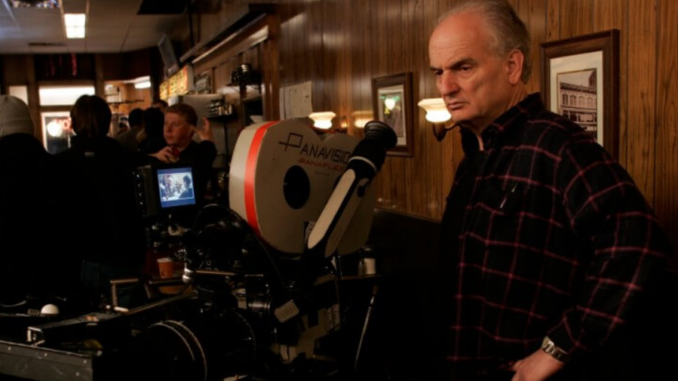
David Chase is a funny guy. He’s arguably the greatest TV show of all time, but he loves television (so much so that, before The Sopranos was picked up, he planned to abandon the medium entirely to write feature-length scripts on demand). And his series has the best line about nostalgia ever written (“Remember when was the lowest form of conversation”), but here he is, reminiscing while being all over the place in Alex Gibney’s new two-part HBO documentary Wise Guy: David Chase And The Sopranos. “I really regret the fucking amount of words from this morning,” he vents to Gibney, sitting across from him in the same office where Dr. Melfi restrained Tony for six remarkable seasons on The Sopranos (a little blunt, sure, but it works). “Honestly, I don’t know about this.”
Like The Sopranos—and more specifically, its central antihero—Wise Guy makes the argument that it all comes down to his mother. Chase’s mother is the inspiration for his writing project (which was treated as a film before becoming a TV show), the reason he starts therapy (where, as the writer puts it, “I’m getting a new mother—that’s what Tony’s doing”), the hovering presence he’s always trying to escape (he leaves New Jersey for the West Coast on the night of his wedding, a move encouraged by concerned family members), the cause of a family dynamic he can’t escape (“they’re just unhappy people,” he says of his parents), and a character so surprising that Livia Soprano, Tony’s mother’s black hole, was the hardest to cast (the role ultimately went to the great Nancy Marchand).
But while Wise Guy is introduced by Chase and explored, especially in part one, his life (with Super-8 videos of his childhood spliced with similar footage from The Sopranos, and the author reflecting on having his mind blown by Jean-Luc Godard and Federico Fellini and his ambitions to become a filmmaker cemented by an acid trip), the documentary also pays equal attention to the show’s legacy and creation. If you’re a big fan of The Sopranos—and if you’re not, what?—watching Michael Imperioli’s audition as a young man (who initially scoffed at the idea, wrongly thinking, “[Chase] isn’t even Italian—what does he know?”), a crowd of 14,000 people turning up for an open casting call in a New Jersey town, James Gandolfini making faces and making funny noises to distract Lorraine Bracco during a tense scene, and Terence Winter describing the grueling but inspiring process of writing a screenplay has a certain thrill behind the scenes.
And the same can be said for the fun trivia night tidbits, of which there were plenty, including Tony Sirico (the funniest actor on television), who did his own hair and makeup, not wanting to ruin his hairstyle during the filming of “Pine Barrens,” or Drea de Matteo detailing one of the most difficult scenes in television history, saying that Chase told her, “I’m going to shoot this scene two ways—I’m going to shoot you escaping, and I’m going to shoot them killing you, and no one will know which way it ends until it airs.”
But the inevitably tragic piece of this puzzle, to which much of season two is dedicated, is James Galdolfini. And the doctor, just by performing the piece, serves as a stark reminder that he was a generational talent, on par with Philip Seymour Hoffman, who died a year after him, or any actor from any era, really. Now, it’s a cliché to type out “there’s never been a show like this on TV,” but there really has been, and Wise Guy tackles the demons and drama of Galdolfini’s production without letting them overshadow the great performance or trying to cram too much into his head. As Chase puts it plainly, “He said he had to go to places that were both destructive and painful for him.” (To the project’s credit, only people who worked on The Sopranos were interviewed.) The other inevitable part here is the show’s ending cut to black, which, if you know anything about Chase—or, frankly, appreciate what this show has done over the years—is resolved exactly the way you’d expect. Though the author does explain that when he wrote it, he was thinking about the nature of the universe — or, to quote the pin drop in the final scene, “Don’t Stop Believin’,” that “the movie never ends / it just goes on and on.” And fittingly, Wise Guy might just remind you to start watching it again.